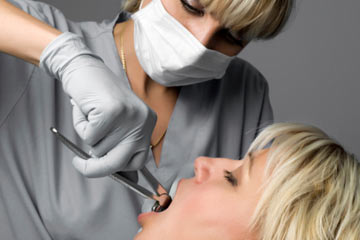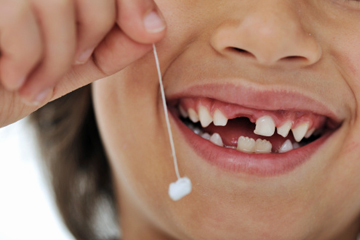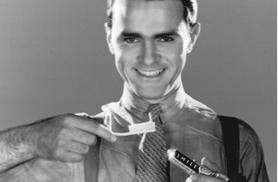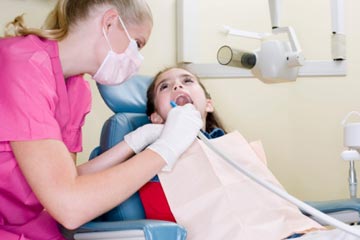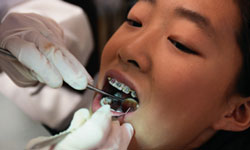
Visits to the orthodontist’s office are nearly the norm for kids with crooked teeth. The endless progression of dental impressions, braces, headgears and retainers can suck up years of time and effort, causing no end of discomfort to your child and, of course, wreaking havoc on your wallet.
All this fun isn’t just for middle schoolers and teenagers — the American Association of Orthodontists recommends that kids see an orthodontist by the time they’re 7 years old. If they get in while they still have most of their baby teeth, the logic goes, the orthodontist might be able to detect and fix problems that otherwise might take years to correct.
So, what are the options for straightening your child’s teeth? As it turns out, they’re not so different from when you were a kid. Unfortunately, there haven’t been any revolutionary advancements in the field of orthodontics that will allow your child to have shining rows of pearly whites in a matter of months. Treatment times have decreased a bit, but traditional metal braces and retainers are still the rage — although braces are a little smaller nowadays (and sometimes clear). So, chances are you’re in for the long haul. But that’s a small price to pay for a beautiful smile.
Contents
- Serial Extraction
- Braces
- Headgear
- Appliances
- Invisalign
1: Serial Extraction
There’s a chance that you might not have to sacrifice your child’s college fund so she can have straight teeth. Sometimes a little tooth-pulling — otherwise known as serial extraction — is all that’s needed to make things fall into place. This is where it could be really beneficial to take your child to the orthodontist when she’s young: If the doctor is able to pull some baby teeth, it could create room for permanent teeth to grow into a less crowded mouth. We’re not making any promises here, but that could save your child the pain and you the cost of years of orthodontics [source: Medicine Net].
Did You Know?
According to the American Association of Orthodontists, one in five orthodontic patients is an adult.
2: Braces
When you think "teeth straightening," your mind might automatically leap to a vision of your preteen self with a mouth full of metal. Although the world of orthodontics has changed with the times in many ways, some things — like braces — remain largely the same. Chances are that if your child sees an orthodontist regularly, he’ll have braces at some point. They might be clear or porcelain (or maybe even on the back side of his teeth), but they’ll probably be metal — and, unfortunately, just as painful as you remember [source: Medicine Net].
Who You Callin’ Brace Face?!
For those who hate the mouthful of metal, lingual braces, which are applied to the back of the teeth, could be for you [source: AAO].
3: Headgear
Just the mention of the word headgear might send shivers down the spines of many people who wore braces in their formative years. A headgear is worn around the head and face to help correct jaw alignment problems. You’d be excused for thinking that these devices — which some might say resemble medieval instruments of torture with their straps, wires and metal bands — were a relic of the ’80s, but they’re still around. Just hope that if your child’s orthodontist prescribes one, your kid will only have to wear it at night and not (horrors!) to school every day. We sympathize, kids [source: Medicine Net].
No Pain, No Gain?
Clear, tooth-colored and lingual braces are considered more attractive than traditional metal braces, but they’re actually less effective, less efficient and not as sturdy [source: Newswise].
4: Appliances
“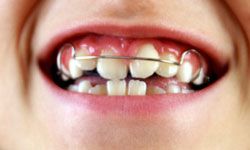
Hemera/Thinkstock
There’s a large variety of devices, both fixed and removable, that fit into a child’s mouth to move teeth or change jaw position. The technical term is appliances, but kids will probably just call them retainers. Your child might have to wear a retainer to get his teeth ready for braces, but they’re more often used (first around the clock, then just at night) to keep things in the right position after braces have done their work [source: AAO]. They’re also notorious for getting lost, often in school cafeteria trash cans.
5: Invisalign
“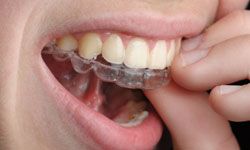
©iStockphoto.com/Steve Shepard
Invisalign — a removable, clear polyurethane device that fits over the teeth — gets a lot of press as an orthodontic option for adults who want to avoid the maligned "brace face" look. But it’s an alternative for teens, too. All the wearer’s permanent teeth have to be in, so orthodontists usually don’t recommend it for patients younger than 13. There’s also the responsibility factor: Invisalign has to be worn 20 to 22 hours a day and removed for meals, so younger kids might have trouble hanging on to them. Patients get a new device every two weeks, and the treatment can be pricier than braces, although it takes about the same amount of time [source: Invisalign].


